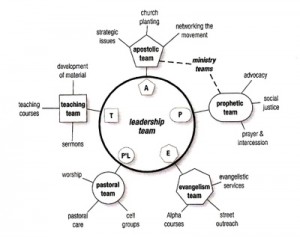 In Chapter 5, Hirsch unpacks how the missional-incarnational impulse literally shapes the local church. Linking the two words is key. We cannot live out the mission of the church without fleshing it out in our neighborhoods, workplaces, subcultures, etc.
In Chapter 5, Hirsch unpacks how the missional-incarnational impulse literally shapes the local church. Linking the two words is key. We cannot live out the mission of the church without fleshing it out in our neighborhoods, workplaces, subcultures, etc.
Four marks frame incarnation, or how we present Jesus in us: presence, proximity, powerlessness and proclamation. Using these guidelines, the church can be fleshed out in different cultures.
Hirsch states that Christology (your view of Christ) determines Missiology (what the Church should be up to) which determines Ecclesiology (the structuring of the church.) Overtly, he’s arguing against an attractional paradigm, however, this also stands against traditional denominational org. charts.
Chapter 6 describes the Apostolic Environment. Taking his lead from the book of Acts, Hirsch suggests that the Church cannot be missional without Apostolic leadership. The Apostle pioneers new ground, protects the DNA of a movement, and creates an environment from which other ministries can emerge.
Drawing from Ephesians 4:7-11, Hirsch demonstrates that the Apostolic leads to Prophetic, which in turn lead to evangelistic, pastoral and teaching ministries. This “APEPT” model stands in stark contrast to the Western church’s focus on the Pastoral and Teaching ministries.
When have you seen a Church become truly incarnational? Have you ever been a part of a church that intentional utilizes the entire APEPT?









 Tweets
Tweets